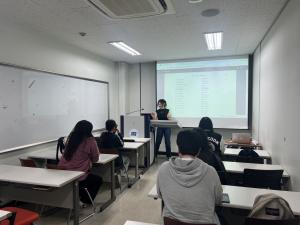Have you seen the recent controversial picture featuring K-pop idol Sulli and Ku Ha-ra? The two pop idols appear in a phot by photographer Rotta, sharing a single t-shirt with the words ‘Johnson’s Baby Oil’ on it. The pop stars are seemingly naked underneath the shirt and are wearing modest makeup while depicting an expression of shame. Netizens criticized the picture claiming it represented the ‘Lolita Complex’, otherwise known as Lolicom. Some went as far as reporting the picture to Johnson and Johnson, the makers of Johnson’s Baby Oil, to protest their logo being used in the Lolicom picture. The backlash led to further criticism of Rotta’s previous work causing his fans to come to his defence. They argued that his work was simply a different form of art and that his freedom of expression should be protected.
I believe that photographer Rotta promotes the image of grown women as innocent, yet sexualized, children and this is wrong and should be stopped, for many reasons. Rotta’s work is a form of lolicom. Lolicom is an expression that evolved from the novel ‘Lolita’ by Vladimir Nabokov. In the story, the main character, an adult male, develops an obsession over a 12-year-old girl. Therefore when a man is sexualizing a young girl, it is known as lolicom and people who think of children as sexual objects for their enjoyment are said to have the Lolita Complex. The problem of Lolicom is that it is impossible to have an equal sexual relationship when one of the parties is an immature being, such as a child. When the parties are unequal, the weaker of the two is being exploited.
Moreover, the ‘taste’ for the sexual exploitation of children is a serious problem in Korea and should not be encouraged. According to the government’s Youth Commission, children under the age of 13, represent 73.6% of the total number of sexual assault cases reported and this rate is sadly on the rise. So, while I agree that people have their own tastes and should be free to enjoy their interests, if their tastes endanger the safety of others, especially young children, then this should be enough grounds for banning this form of expression. Minors should never be portrayed as desirable sexual objects.
Rotta argues his work is innocent and styled in the ‘Mi-So-Nyeo’ (pretty little girl) of Japanese Manga, while others will argue it is pornography. Women in Rotta’s work as well as in Japanese Manga, express a sense of shame and innocence on their faces while posing in a sexual manner. In Rotta’s work in particular, adult women can be seen with modest makeup, sometimes wearing nothing but loose fitting underpants or a fitted t-shirt and short-fitted pants or school uniforms. Arguably the only difference between Rotta’s work and pornography is the shame and innocence portrayed on the faces of the girls in his photos. The women in the pictures are portrayed as child-like and sexual objects simultaneously.
Rotta also argues his work of ‘pretty little girls’ depicts ‘purity’, not pornography. Ask yourself, do ‘pure, pretty little girls’ wearing fitted short pants and shirts pose with their buttocks in the air? This is only possible in the fantasies of voyeuristic men. Rotta’s work helps perpetuate the fantasy that young untapped girls will lift their shirts only for the viewer and her peculiar gaze is inviting him to watch.
Even if you don’t believe Rotta’s work is an expression of Lolicom, the childification of grown women while depicting them as sexual objects deserves to be criticized. Producing images depicting young innocent girls that are seemingly suggesting they secretly desire sexual guidance and leadership in the bedroom is wrong. It encourages men to treat ordinary women in the same manner. In other words, men can be led to believe that it is their responsibility to guide women to have sex whether they are ready or not. This is what Rotta is encouraging in his work.
Rotta’s portfolio is troubling because it ‘childifies’ women, framing them as sexual objects of temptation. People have their tastes and should be able to enjoy them. However, expressing a sexual desire for immature people that cannot protect themselves, is absolutely wrong, and Rotta’s work is beautifying this kind of ugly desire. With media comes responbility. If people are uncomfortable with Rotta’s work because of the way it portrays women and girls, then the publication of it should be stopped.
박해지 dankookherald@gmail.com

 Pioneering Education for a New Era of Dankook: PRIMUS International University
Pioneering Education for a New Era of Dankook: PRIMUS International University






